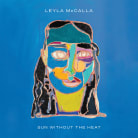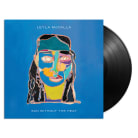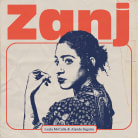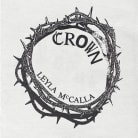Leyla McCalla
Born in New York City to Haitian emigrants and activists, Leyla McCalla finds inspiration from her past and present– her music vibrates with three centuries of history and influences from around the globe. McCalla possesses a stunning mastery of the cello, tenor banjo and guitar and, as a multilingual singer and songwriter, has risen to produce a distinctive sound that reflects the union of her roots and experience. In addition to her solo work, McCalla is a founding member of Our Native Daughters (with Rhiannon Giddens, Amythyst Kiah and Allison Russell) and alumna of Grammy award-winning Black string band The Carolina Chocolate Drops.
McCalla’s new album and fifth studio recording, Sun Without the Heat (ANTI, April 12), is playful and full of joy while holding the pain and tension of transformation. Throughout Sun Without the Heat’s ten tracks, McCalla achieves a balance of heaviness and light with melodies and rhythms derived from various forms of Afro-diasporic music including Afrobeat, Ethiopian modalities, Brazilian Tropicalismo, and American folk and blues.
Her 2022 album, Breaking the Thermometer (ANTI-), is the album companion to a multidisciplinary music, dance and theatre work commissioned by Duke Performances. Through the story of the brave journalists at Radio Haiti who risked their lives to report news in Haitian Kreyol, Breaking the Thermometer identifies the critical importance of a free and independent press to promote self and societal liberation. Breaking the Thermometer was named one of the Best Albums of the year by The Guardian, Variety, Mojo and NPR Music, and her song “Dodinin” made Barack Obama’s short list of favorites. McCalla was awarded the 2022 People’s Voice Award by Folk Alliance International, an award given to artists who unabashedly embrace social change in their creative work.
While conceiving her next project, McCalla expanded her musical palate and revisited her longstanding creative influences. “I like when music feels urgent,” McCalla says, “but I also wanted the new album to be playful and fun. I wanted that levity to come through.”
On Sun Without the Heat, McCalla draws lyrical inspiration from the writings of Black feminist Afrofuturist thinkers including Octavia Butler, Alexis Pauline Gumbs, and adrienne maree brown. Like these authors, McCalla looks to songwriting as a way to increase faith and hope, encourage community thinking, and catalyze personal transformation. “Songwriting is a modality to tell the stories that need to be told,” she explains. “Sometimes these are painful stories to tell.”
This is especially vivid in the album's title track, which pulls from Frederick Douglass’s 1857 speech to a largely white crowd of abolitionists six years before the Emancipation Proclamation. His words echo in the song: “You want the crops without the plow / You want the rain without the thunder / You want the ocean without the roar of its waters.” Douglass’s point — which McCalla weaves into the song's central message —is that liberation and equity are not possible without committing to transformative action.
“We all want the warmth of the sun but not everybody wants to feel the heat,” McCalla explains. “You have to have both.”
Moved by this speech, and by Susan Raffo’s 2022 book Liberated to the Bone, McCalla asserts this idea fully by adding the lyric: “Can’t have the sun without the heat.” This song serves as a reminder of the continued work for social change and the struggle that we still bear. “These wounds,” McCalla reminds us, “are so old.”
Sun Without the Heat was recorded in an intense nine-day session at Dockside Studies in New Orleans. Produced by Maryam Qudus, McCalla was joined by longtime bandmates and collaborators Shawn Myers on percussion and drums, Pete Olynciw on electric bass and piano, and Nahum Zdybel on guitars. Qudus is featured on synthesizers, organs and backing vocals.
“Usually, I go into the studio and have the songs and the framework already in mind,” says McCalla. “But with this album, we built the frame in real time. It was an intimidating process, but it also helped me realize how held I am by the musicians I work with.”
The result is a transcendent collection of songs that hold the personal and universal, carrying grief and joy at once. Through this album, McCalla explores the elements of transformation and the heat necessary to move from darkness toward light.
Sun Without the Heat will be released via ANTI- Records. McCalla is also currently the Artist in Residence at the University of Richmond.
See All Videos
Leyla McCalla - "Open The Road"
See All Recent Press
- Leyla McCalla Shares Inspiring New Video For "Open The Road", Listen to Aquarium Drunkard Transmissions Interview
- Leyla McCalla Shares Title Track From New Album 'Sun Without the Heat', Out This Friday; On Tour Now
- Leyla McCalla Shares "Love We Had" From Upcoming Album Sun Without the Heat, Performing at Big Ears, NOLA Jazz Fest + More
- Leyla McCalla Announces New Album 'Sun Without the Heat', Shares Double Single "Scaled To Survive" and "Tree"
- Leyla McCalla Chris Scheurich
- Leyla McCalla Bio (2024)
-
Apr 12th 2024
Purchase
Sun Without The Heat






